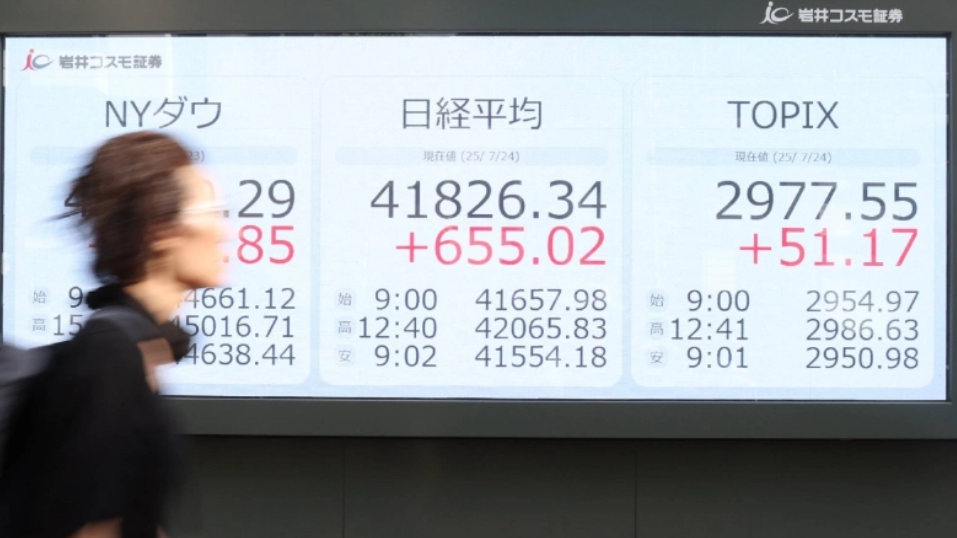Japan investors brace for BOJ and earnings results after Trump-fueled rally
- Hge News

- Jul 28, 2025
- 4 min read
Japan’s surprise trade deal with the U.S. sent its markets on a wild ride, pushing stocks to all-time highs and fueling a selloff in government bonds.

Automakers’ shares led a market-wide surge after U.S. President Donald Trump announced the deal on Wednesday. The broad Topix index hit a record close.
Investors, finally having some good news, seemed to largely ignore thorny questions about the details of the trade deal, let alone the tenuous position of Prime Minister Shigeru Ishiba following a recent election setback.
But as the dust settles and focus returns to problems closer to home, investors are questioning whether the rally was a sign of things to come — or just a blip for a market that is facing multiple sources of volatility in the coming weeks and months.
"The deal came and there was this immense relief, and now markets are saying: ‘hang on, not too much,'” said Vishnu Varathan, head of economics and strategy at Mizuho Bank. "It’s a relief that we didn’t bleed to death. But we are still in triage, if not the ICU.”
The headache for investors in Japan is that almost every piece of good news comes with a caveat.
The trade deal was a clear win, but the 15% tariffs facing Japanese companies are still well above their level at the start of the year.
The economy may get a boost, but that could in turn speed up interest rate hikes. The deal removes one reason for Ishiba to cling to power — since he had made clear he wanted to get it done while in office — but the win means he now has a better case for hanging on.
That has shifted attention to some major events in the coming days, which will offer clues to the direction of travel for a stock market that has underperformed its regional peers this year.
The Bank of Japan’s monetary policy announcement on Thursday, although unlikely to result in a rate change, will be scrutinized for hints that the central bank may hike as early as September. That could hit both bond and stock prices.
Investors will also be focused on corporate earnings, with Fujitsu, Tokyo Electron and Nissan Motor among the companies set to report.
Those earnings will be far too early to gauge the impact of the trade deal, but they will help investors get a sense of how strong Japanese companies are as they prepare for a prolonged period of higher tariffs — however good the figures might look compared to the worst case scenario.
The 15% tariff on Japanese goods, including autos, was a relative reprieve from earlier threats of 25% or higher. Japan also agreed to invest $550 billion into the U.S. as part of the deal, a vague pledge that has left market participants guessing at the potential details.
"You’ve certainly got the makings of an extended rally,” said Pelham Smithers, an analyst who runs an eponymous Japan equity research firm in the U.K. "But the bigger questions will be Bank of Japan policy, and whether Trump backtracks on this tariff deal.”
Smithers, who was engrossed in the video-game Civilization when news of Trump’s Japan deal broke, says his "army of sales people” were swamped with calls from clients asking for updates on Japan’s market.
The enthusiasm is understandable. After trading sideways for most of July, the Topix Index jumped 4% over the course of the week, notching a new all-time high. Toyota Motor’s shares posted their biggest intraday gain since 1987. SoftBank Group's shares hit a record high.
Japan’s 10-year bond yields reached their highest level since 2008 after the trade deal was announced. Two-year yields, which are sensitive to changing interest rate expectations, also jumped.
"The tariff news was a complete positive surprise,” said Hisashi Arakawa, director and head of equities at abrdn Japan. "I didn’t expect the market to move that quickly.”
The outlier to the wild moves was the yen, which fluctuated between gains and losses as traders digested the news.
Caution was returning to the stock market by the end of the week, with both the Nikkei 225 index and the Topix closing down almost 1% Friday, part of a wider decline in Asia.
One major concern is that the weakened government — whether led by Ishiba or someone else — may give in to opposition calls for tax cuts, worsening Japan’s already stretched fiscal position. Worries about government finances have weighed on global debt markets in recent months, hitting Japan’s ultralong bonds alongside those in the U.S. and elsewhere.
Local media reports that Ishiba will soon announce his resignation have fueled these concerns, although he denied the reports.
For now, investors in Japan have more questions than answers. The country’s trade relationship with the U.S. is, more or less, clear. But almost everything else remains in flux, and market watchers think the recent rally may reflect hope more than reason.
"We all need to cool our heads and regroup,” said Yusuke Sakai, a senior trader at T&D Asset Management in Tokyo, who called the stock rally a knee-jerk reaction.
#WORLD #JAPAN #PACIFIC #BREAKINGNEWS #RECENTNEWS #SPECIALNEWS #MONDAYTHOUGHT #MONDAYVIBES #MONDAYSPECIAL #2025





Comments